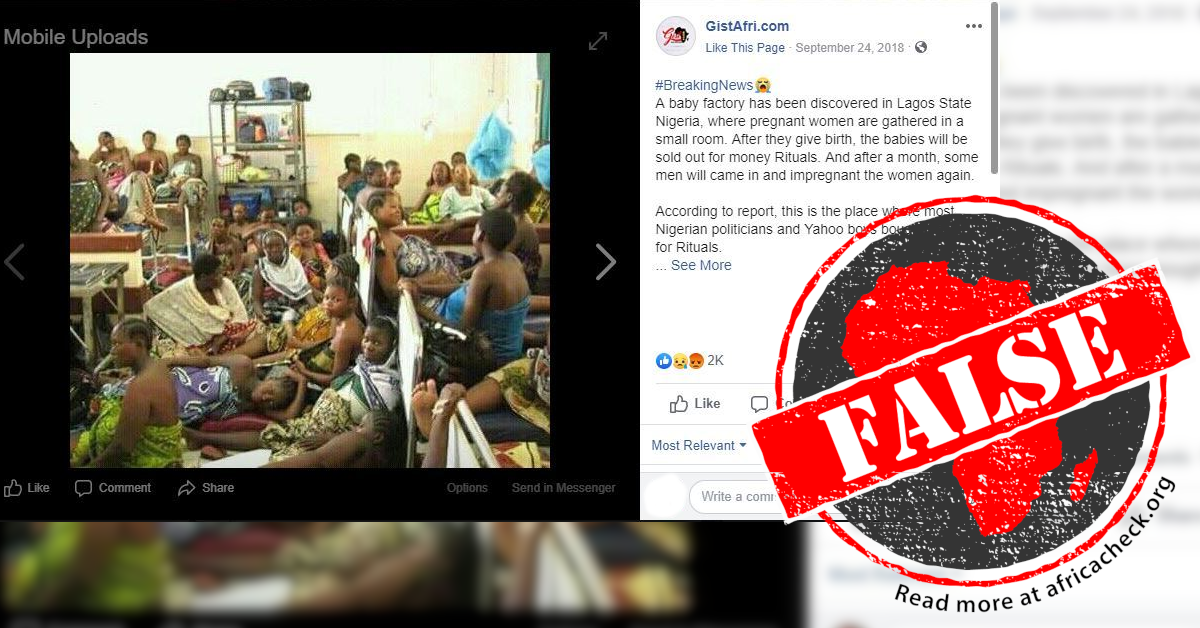In early 2018, Nigerian police raided a number of baby factories in Lagos, the commercial capital, in one case rescuing over 100 children.
“Baby factories” are where pregnant women, mostly unmarried, are housed until they give birth and their baby sold for adoption or killed for ritual purposes. There are claims women are raped and made pregnant by men running the factories.
A September 2018 Facebook post claims there was a baby factory in Lagos, yet to be discovered by the police, “where pregnant women are gathered in a small room. After they give birth, the babies will be sold out for money Rituals. And after a month, some men will came in and impregnate the women again.”
It adds that “according to report, this is the place where most Nigerian politicians and Yahoo boys bought babies for Rituals”.
The post includes a photo of dozens of women crammed together on the floor and beds of a large room.
It claims the photo was “leaked by one of the ‘Yahoo boys’ [online fraudsters and other criminals] that went their to buy a baby for Rituals” and asks users to help make the photo go viral.
It ends with a passionate appeal: “Save These Pregnant Women; Save The Innocent Kids; Save Nigeria”.
Apparently, quite a number of people responded to the appeal as the post was shared by over 12,000 Facebook users in less than eight months.

Reverse image searches on Google, Tineye and Yandex reveal that the photo has been used online to show maternity hospitals in different African countries such as the Democratic Republic of the Congo, Ghana, Tanzania and Nigeria, with dates ranging from 2012 to 2019.
But the earliest use of the photo, thrown up by Russian search engine Yandex, comes from the blog Taylar’s Travel - An account of a student midwife’s experiences in developing countries.
The blog’s author, Taylar Dykstra, recounted her experiences as part of a team giving medical care to pregnant women somewhere in Tanzania. She published the photo with the caption: “A photo from the hospital we work at (labour ward)”.
In the blog post, published on 13 November 2009, Dykstra says: “The maternity wards we work in are also maxed out with up to five women per bed and many on the floor.” – Allwell Okpi (21/05/19)
“Baby factories” are where pregnant women, mostly unmarried, are housed until they give birth and their baby sold for adoption or killed for ritual purposes. There are claims women are raped and made pregnant by men running the factories.
A September 2018 Facebook post claims there was a baby factory in Lagos, yet to be discovered by the police, “where pregnant women are gathered in a small room. After they give birth, the babies will be sold out for money Rituals. And after a month, some men will came in and impregnate the women again.”
It adds that “according to report, this is the place where most Nigerian politicians and Yahoo boys bought babies for Rituals”.
‘Save the innocent kids’
The post includes a photo of dozens of women crammed together on the floor and beds of a large room.
It claims the photo was “leaked by one of the ‘Yahoo boys’ [online fraudsters and other criminals] that went their to buy a baby for Rituals” and asks users to help make the photo go viral.
It ends with a passionate appeal: “Save These Pregnant Women; Save The Innocent Kids; Save Nigeria”.
Apparently, quite a number of people responded to the appeal as the post was shared by over 12,000 Facebook users in less than eight months.

Photo of Tanzanian maternity ward taken in 2009
Reverse image searches on Google, Tineye and Yandex reveal that the photo has been used online to show maternity hospitals in different African countries such as the Democratic Republic of the Congo, Ghana, Tanzania and Nigeria, with dates ranging from 2012 to 2019.
But the earliest use of the photo, thrown up by Russian search engine Yandex, comes from the blog Taylar’s Travel - An account of a student midwife’s experiences in developing countries.
The blog’s author, Taylar Dykstra, recounted her experiences as part of a team giving medical care to pregnant women somewhere in Tanzania. She published the photo with the caption: “A photo from the hospital we work at (labour ward)”.
In the blog post, published on 13 November 2009, Dykstra says: “The maternity wards we work in are also maxed out with up to five women per bed and many on the floor.” – Allwell Okpi (21/05/19)
Republish our content for free
For publishers: what to do if your post is rated false
A fact-checker has rated your Facebook or Instagram post as “false”, “altered”, “partly false” or “missing context”. This could have serious consequences. What do you do?
Click on our guide for the steps you should follow.
Publishers guideAfrica Check teams up with Facebook
Africa Check is a partner in Meta's third-party fact-checking programme to help stop the spread of false information on social media.
The content we rate as “false” will be downgraded on Facebook and Instagram. This means fewer people will see it.
You can also help identify false information on Facebook. This guide explains how.





Add new comment